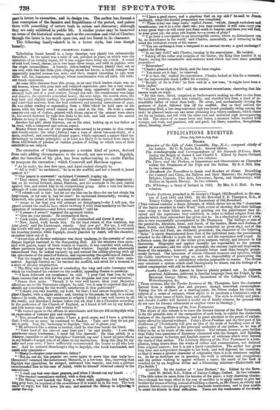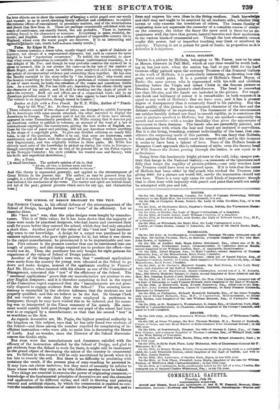PUBLICATIONS RECEIVED.
Item Arty 25th SO.IaZV 3114.
Boons.
Memoirs- of the Life of John Constable, Esy., B.A.; composed chiefly of his Letters. By C. It. Leslie, RA. Second edition.
The, Autobiography and Correspondence of Sir Simonds D'Ewes, Bart. during the Reigns of James I. and Charles L Edited by James Orchard, Halliwell, Esq., F.R.S., Sec. In two volumes.
The Tiara and the Turban, or Impressions and Observations-on Character within the Deminiors of the Pope and the Sultan. By S. S. Hill, Esq. In two volumes.
A Handbook for Travellere in Spain and Reads., at Home. Describing the Country and Cities, the Native] and their Mannera; the Antiquities, Religion, Legends, Fine Arts, Literature, Sports, and Gastronomy; with Notices on Spanish History. In two volumes.
The Whiteboy ; a Story of Ireland in 1822. By Mrs. S. C. Hall. In twe volumes.
Twelve Lectures, preached in St. George's Chapel, Old Breatford, in the sear son of Lent 1844 and 1845. By the Reverend F. E. Thompson, BA., of Trinity College, Cambridge, and Incumbent of Oldelkentford. [This volume-contains a.dozen sermons, of which eleven are on the " charactens: of the Saints recorded in Gods Word," with review of showing that their failingal were owing to their fallen nature and pointing out the punishment they re,.,
wired and the repentance they exhibited, in order to defend religion from the; attacks which their misconduct has given rise to. Ins theological point of view'; this is very successfully accomplished by Mr. Thompson. The failings or sins of
the patriarchs, Abraham, Isaac, and Jacob, of the leaders, Moses and.Joshus, of) t, David, and Daniel, (though the last committed no gross sin,) and-of the: apostles Peter and Paul, are- distinctly presented; the character of the believing-
"Saint" is nicely diecrimioated from that of the individual man; the punislunWe awarded to the offender is made the most of, and his repentance well urged. lee a literary sense, the plan of the writer gives purpose, variety, and interest to Mt discourses. Biography and applied morality are superadded to the genera/
matter-of aaermon; and-the style is-agreeable, the manner rapid and impressive. Some-of the examples, however' are probably better sunk than brought promi- nently forward. Our. Ignorance of. remote Oriental manners and Opinions, whilst' the visible interference was going. on, and the impossibility of penetrating thee Divine intention, render a satisfactory- solution impossible to regime The divine, may construct a system which shall theologically lee intact.; but the feelings of ai mixed congregation will still be dissatisfied-.] Jacob's Ladder; the Assent to Heaven plainly pointed out. In e...wwns practical Addresses, delivered in familiar language from the Pulpit, by thee Reverend. George Oliver, D.D., Incumbent of the Collegiate Chtuch,, Wolverhampton, &c.
[These sermons, like the Twelve Lectures of Mr. Thompson, have the charade' derived from a definite plan and purpose, though somewhat commonplace. Taking the life of Jacob as a starting-point, Dr. Oliver makes his vision ths, subject of a series of sermons, whose object is to inculcate a Christian's rule of, life on-the three bases of-faith, hope, and charity. The style is clerkly and plain; and Jacob's Ladder will furnish a useful set of family sermons for persons who do not care for literary refinement or original views in theology.] The Literary History of the New Testament.
[The object of this volume is to -trace the literary history-of the New Testaments. to fix the probable date of the cornpoeition of each book, to exhibit the distinctive;
features-of the Apostolic writings, and to .." t attention to the proofs of authen- ticity offered by internal evidence. l'aley's ores Paulinas and the first part of his Evidences of Christianity, will give an idea of the mode of handling some of the
topics; and Dr. Lardner is the principal authority of our author, as he was of Paley so far as he treats of the same subject The volume, however, goes further than Paley into questions-of literature connected with the Gospels and Epistles,- and has recourse to-foreign and English sources of criticism which were beyond the reachof that author. The Literary History of the New Testament is a com- pilation, being drawn from the works of critics and commentators, not deduced from original sources; but it is not a hasty compilation. The author has given long time and independent thought to his work, and well digested his materials, so. that. it wears-a greater character of originality than it, lain strictness entitled to. So far as doctrines are in question, the work is orthodox and evangelical; and, the author wishing to appear without a name, the merit of the book is vouched for by an Anglican divine and a Dissenting minister—Bickersteth and Pye Smith.]
Gertrude. By the Author of "Amy Herbert," Sso. Edited by the Rem, rend W. Sewell, B.D., Fellow of Exeter College, Oxford. In two volumes. [The title- takes its name from the heroine of the piece; a very charming charare- ter,—though her main effort in the way of sacrifice is to apply money to give her - brother the meansof living, instead of building a church, as Me Deere, an elderly and pattern Nabob, conveys Ins property to charitable institutions and is then unable: to assist his friends in their difficulties. These' are the weaknesses of Gertrude: -
Its true objects are to show the necessity of keping a strict guard over our words and manner so as- to avoid .checking family affection• and confidence; to exhibit the:microns 'effixts of concealment in pecuniary matters, amid the wretchedness audZieeit that flow from it. These are iierhapen occasionally.exhibited with.too rauch.of contriva.nce, not.exactly forced,, but net probable:. These is, however, nothing forced in the characters or manners. Everything is, quiet, truthful, do- mestic, and English. Gertradeis a-cabinet-picture of respectable country life in
England, where even the worst people are-decorous. It is interesting and. agmeabletclidactic tale, worth half-a.olozen trashy. novels.] Tales: By-Edgar H. Poo:
ETtita. .volttme contains .a dozen- tales, mostly 'tinged with a• spirit-of diablerie mystery, not always of a supernatural-character, but such as caterers fornews delight. to head "mysterious occurrence." To iinfold. the wonderful, to show that what:seems miraculous is amenable to almost mathematieal.reasoning, is a real delight of Mr-Poe: and though he may probably contrive the mystery, he is about to unravel, this is- not always the case—aalysthe tale of. the murder of
Marie Iloget; and in all cases he exhibits great irr seizing upon the points of circmustantial evidence and connecting them -together. He has also the, faculty essential to the story-teller by "the winteris fire," who would. send. tha hearers trembling to theirheds--clespite a pefusion.of rainate.circumstanees-
.not of mere words, he hokls the:attention of the - reader and sometimes- unit& him. As a :novelist, Mr.- Poe has littleart; depending-foriniteffeets chiefly upon- the-character of his subject, and his skill in working out-the chain-of proofs. to solve, the mystery. Both art and effects are of a nragazinish kind; and in an American. periocheal some if not all of the. tales aipoar to.have been published: The volume is an importation, though issued. in London.]
Dashes at Life with a Free Pencil. By-N. P. Willis; Anther of!" lings by the Way," &c. In three volumes.
[These volumes consist of two classes of tales-- one desigardito exhibit European life to Americans with some morals attached, the other intended to display the Amer:leans to Europe. The greater part if not the whole of them have already appeared in some Transatlantic periodical; Mr. Willis stating that it does not pay. an:A• Merman author to publish in volumes, on account of the want of slaw of international copyright: Ws countrymen, getting the best works of. English an- thers,for the cost of paper and printing, will not pay American writers anything in the shape of a copyright price. To give any detailed criticism on nearly fifty taker is out of . the question. Suffice it to say, that some are humorous, some sentimental, and all-short, with the exception of Henry Clay; which, however, is very fragmentary, and was originally written in three part, Mr. Willis has cleverly used some of the knowledge he picked up dining -his visits to Europe,— though conveying-about as true an idea of its generallfe- as- the Prince reports' or the Newgste Calendar: his style exhibits his wonted ease and fluency, with hit:-facile and superficial sketchiness.].
Sin; a Poem. [karnall brochure, The author's opinion of sin is,. that
All sin, all vice, is neither more not less Than 'virtuous passions carried to excess."
And; this: theory is expounded generally, and applied to the circumstances' of Great Britain in. the present day. The author, as may be guessed from his couplet, is a follower of the school of Pope; and it is carious how successfully, he hasanutated the mechanics of the verse. The matterand spirit are behind-hand, yet not of the past; general pictures which serve for any age, and characterize none]



























 Previous page
Previous page